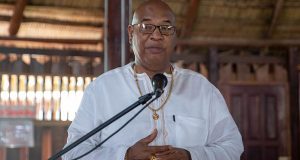BRIDGETOWN, Barbados, Apr. 6, (CMC) – Caribbean countries were, today, continuing to distance themselves from the so called “Panama Papers”, which alleged that a number of world leaders and other prominent people used a law firm in Panama to develop off-shore companies to evade taxes.
In Jamaica, the corruption watchdog, National Integrity Action (NIA), in a statement, called on the Major Organised Crime and Anti-Corruption Agency to collaborate with international law enforcement partners and commence a probe to determine whether any Jamaicans are involved.
It is also calling on local media practitioners to reach out to the International Consortium of Investigative Journalists, which has been releasing stories from the documents, “to identify and unmask any Jamaicans involved in this corruption, among the scores of public officials, political leaders and billionaires” implicated by the leaks.
The NIA also reiterated its call for the “secret beneficial owners” of offshore companies, who bid for Jamaican government contracts, to be made public.
In the Cayman Islands, the Chief Executive Officer of Cayman Finance, Judd Scott, said the British Overseas Territory is not a secrecy jurisdiction.
He said the Cayman Islands financial services industry continues to play a leadership role on international regulatory issues, and for setting global standards to fight financial crime. He also argued that it has a robust regime for regulation and cross-border cooperation in place, surpassing many of the world’s top international financial centres.
In the Bahamas, where Financial Services Minister, Hope Strachan, said the leak of the documents from the Panamanian law firm, Mossack Fonseca, “is disconcerting”, the main opposition Free National Movement (FNM) recalled that the country underwent a traumatic experience in 2000 “when the financial services industry was delivered a near fatal blow with the broad blacklisting by the OECD (Organisation for Economic Cooperation and Development)”.
In a statement, the FNM said that while the report from the leaked documents “does not point out any wrong doing by local financial institutions, it points out the vulnerability of the jurisdiction to be used, unwillingly, as safe harbour for illegally gained proceeds.
“It should also heighten our vigilance for the consistent application of international best practices, necessary to ensure compliance standards and data security is maintained at all levels.
“This leak and the damage it may do to the jurisdiction’s reputation, points out the very serious and damaging potential consequences of the alleged local breach of data security that occurred when private emails were leaked and read in Parliament, followed by specific threats of vengeful prosecution as political payback against specific persons,” the FNM added.
The first casualty of the leak documents is Iceland’s embattled prime minister, Sigmundur Davíð Gunnlaugsson, who tendered his resignation, yesterday, in the wake of a mounting political crisis over his family’s offshore investments.
 Pride News Canada's Leader In African Canadian & Caribbean News, Views & Lifestyle
Pride News Canada's Leader In African Canadian & Caribbean News, Views & Lifestyle




